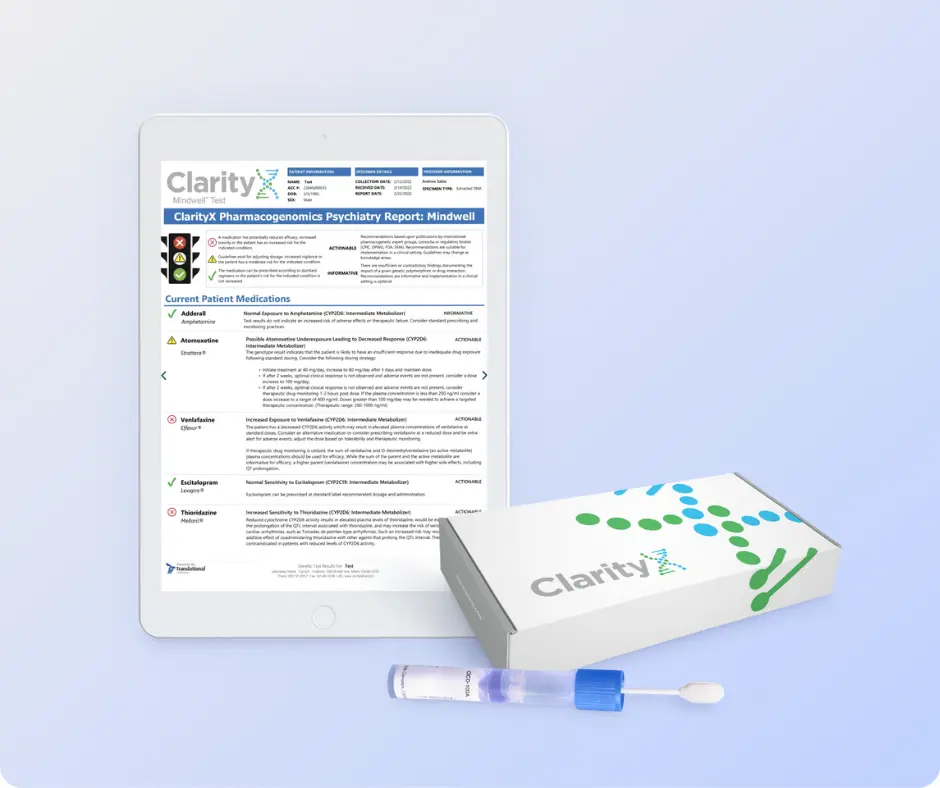Key Highlights
- Trintellix is a prescription medication for adults used to treat Major Depressive Disorder (MDD).
- It may take several weeks for the full antidepressant effects of Trintellix to be noticeable.
- Common side effects, such as nausea, may occur during the first week of treatment.
- It's crucial to take Trintellix consistently for it to become and remain effective.
- Contact your healthcare provider if you experience worsening or lingering side effects before your follow-up appointment.
Introduction
Managing major depressive disorder (MDD) comes with many challenges, and finding the right treatment can feel like a challenge in itself. Trintellix (vortioxetine) is a medication that can help relieve depression symptoms and is becoming more commonly used in recent years.
It’s important to understand how this medication may differ from alternatives, both in how it works and its potential side effects. Let’s take a closer look at Trintellix and what to expect if your healthcare provider has suggested starting treatment.
Understanding Trintellix: An Overview
Managing Major Depressive Disorder (MDD) often requires a mix of strategies. Medication, including prescription drugs, can be a very important part of this. Trintellix is a serotonin modulator with unique activity at serotonin receptors. This means it works a bit differently from traditional antidepressants and may be a good option for individuals who haven’t had luck with other therapies.
While Trintellix can help with recovery, it’s important to know that results take time. In the first week of using Trintellix, you might notice small changes. More noticeable improvements typically show up in the following weeks.
What is Trintellix and How Does It Work?
Trintellix is a type of medication called a serotonin modulator and stimulator. Serotonin is a chemical that helps control mood, sleep, appetite, and other important functions. Low levels of serotonin have been linked to depression.
Trintellix works like selective serotonin reuptake inhibitors (SSRIs) by increasing levels of serotonin activity in the brain. However, it does this in a different way. Trintellix not only stops the process that takes serotonin away from the spaces between brain cells, but it also interacts with various serotonin receptors. This helps to fine-tune how serotonin signals the brain.
This approach makes Trintellix different and may give it a special advantage in treating depression in some individuals.
The Role of Trintellix in Treating Depression
Major depressive disorder is marked by ongoing sadness, losing interest, and social withdrawal, among other potential symptoms.
Trintellix works by rebalancing serotonin in the brain, which may help fix the chemical issues that may cause depressive symptoms. As serotonin levels improve, it may help people feel happier, more motivated, and less hopeless.
It’s important to note that Trintellix is not a quick solution. It doesn’t work immediately; instead, it helps bring slow and steady improvement. Using it regularly, as your healthcare provider advises, is vital to get the most benefit.
The Mechanism of Action: How Trintellix Affects the Brain
Trintellix affects the brain in a way that makes it different from other antidepressants. Brain cells communicate using chemical messengers called neurotransmitters. Trintellix targets serotonin, a neurotransmitter linked to mood control.
Unlike many other medications which only focus on raising serotonin levels, Trintellix also adjusts how serotonin works with certain receptors in the brain. This special way of working makes Trintellix a possible choice for people who may have had difficulty managing depressive symptoms with other medications.
Trintellix and Serotonin: A Key Interaction
Central to how Trintellix works is its close connection with serotonin. Think of serotonin as a messenger that moves between brain cells. It carries important signals that help control mood and emotional state. These messengers attach to special sites called receptors on other brain cells to share vital information.
Trintellix helps improve serotonin's role in this communication. It first stops serotonin reuptake, which means it slows down the process that clears serotonin away. This lets serotonin stay longer between brain cells, giving it more chances to connect to receptors.
Additionally, Trintellix directly interacts with certain serotonin receptors. It can either block these receptors or boost their activity. This unique effect—preventing reuptake and modifying receptor activity—helps explain how Trintellix may affect depressive symptoms differently than other options.
Beyond Serotonin: Other Neurotransmitters Involved
Trintellix mainly affects serotonin, but it is good to remember that the brain has many different chemicals working together. Trintellix may also influence other important neurotransmitters. This includes GABA, dopamine, norepinephrine, histamine, and acetylcholine. These chemicals are important for mood, motivation, thinking, and sleep.
Scientists are still studying how Trintellix interacts with these neurotransmitters. This means we do not fully understand how these connections work yet, but initial research has suggested some changes are likely due to positive and negative feedback produced by its interaction with various serotonin receptors.
Starting Trintellix: What to Expect in the First Week
During the first week, the focus is primarily on determining whether the medication will be well-tolerated. As the body adjusts, there may be side effects. Some of these effects may resolve on their own, but it’s important to let your healthcare provider know if they become worse or linger.
It takes time for Trintellix to become effective. Consistent use for at least several weeks is often needed before substantial changes in mood can be appreciated, so it’s important to be patient when starting the medication or changing the dose.
Side Effects and How to Manage Them
Trintellix, like many medications, can cause side effects. These side effects can be different for each person. Being aware of these and how to handle them can help make your treatment better.
It's important to talk openly with your healthcare provider during your treatment with Trintellix. They can help you better understand what you’re experiencing and can also guide you on changing doses or finding other options if you need them.
Common Side Effects During the First 7 Days
During the first week of Trintellix treatment, you might feel some side effects. This is normal as your body adjusts to the medication.
Some genetic differences may help predict whether certain doses will be more likely to cause side effects. Trintellix is metabolized by CYP2D6 enzymes, and genetic testing can help predict whether someone may benefit from altered dosing at the beginning of therapy.
Some common side effects that may occur early in treatment include:
- Nausea
- Stomach upset
- Diarrhea
- Vomiting
- Dizziness
- Dry mouth
Some of these side effects may improve as your body adjusts to the medication. If they worsen or linger, talking with your healthcare provider can help you determine the best way to manage your symptoms.
Sexual side effects like lower sex drive or changes in orgasms can occur with antidepressant therapy. While these side effects may also occur with Trintellix, they appear to be less common when compared with alternatives. Trintellix is sometimes recommended for individuals who have experienced sexual side effects while using other medications.
Tips for Managing Side Effects at Home
Managing side effects works best with help from your healthcare provider, along with some steps you can take at home. Here are some simple tips to reduce discomfort and improve your well-being while starting Trintellix:
- Dietary Changes: Limit highly acidic foods and drink plenty of water, especially if you have nausea or an upset stomach.
- Gentle Exercise: Try light activities, like walking or stretching, to help with tiredness or to lift your mood. Avoid heavy workouts if you feel dizzy. If you ever feel as though you may fall, it’s important to talk with your healthcare provider.
- Rest and Relaxation: Make sure you’re getting enough rest. Let your provider know if you’re having difficulty sleeping or experiencing changes in sleeping patterns after starting the medication. Changing the dose or timing of the medication can sometimes help. Practices like deep breathing or meditation can help with stress and anxiety.
It's important to keep in touch with your healthcare provider. Let them know about any changes you see or if side effects are bothering you. They can give you personalized advice, adjust your medication, or suggest other ways to help you feel better.
The Importance of Adherence: Taking Trintellix as Prescribed
Taking Trintellix consistently is very important for it to work well. If you miss doses or change how much you take without talking to your provider, it can make the medicine less effective and slow down your progress.
It’s crucial to talk openly with your healthcare provider about any problems you have sticking to your treatment plan. They can suggest helpful ideas, like setting reminders or trying different forms of the medicine. This way, you can stay on track and have a better chance of seeing good results.
Why Consistency Matters: The Effects of Missing a Dose
Missing a dose can change the balance of serotonin in your brain. Because your body is accustomed to different levels of neurotransmitters, it must try to adapt rapidly. This can cause ‘withdrawal’ symptoms, like mood swings or dizziness.
If you miss a dose, do not take two at once to make up for it. Resume your regular schedule at the standard time.
Strategies for Remembering Your Medication
Taking medication regularly requires some thought, especially when starting a new routine. Using helpful strategies can improve how well you stick to your Trintellix treatment plan. The aim is to make reminders for your medication fit naturally into your daily life. This will help you remember to take your doses.
Here are some strategies to stay consistent:
- Visual Cues: Keep your medication somewhere you will see it every day, like next to your toothbrush or coffee maker.
- Digital Reminders: Use alarms on your smartphone or medication reminder apps to get alerts at the right time.
- Habit Stacking: Link taking your medication to something you already do daily, like brushing your teeth or having breakfast.
You can change these strategies to fit your own habits and lifestyle. If you keep having trouble, talk openly with your healthcare provider. They can give you more ideas or change your treatment plan if needed.
Observing Changes: What Improvements to Look For
While some individuals may experience positive changes sooner, it’s common for it to take several weeks before benefits become appreciable. Your healthcare provider will likely want to follow up with you after about four to six weeks to see how you’re doing.
Personal experiences with depression can vary significantly. Some individuals experience lower motivation, energy levels, or a sense of hopelessness. In other cases, anxiety goes hand in hand with depression. Working with a therapist can help you define your unique challenges, develop strategies for managing them, and identify and celebrate positive changes.
When to Consult Your Healthcare Provider
Throughout your Trintellix treatment, it is important to talk often with your healthcare provider. They are there to offer help and make changes if needed for your well-being.
Regular check-ups help to track how you are doing, see if the medication works, and talk about any side effects or concerns. Keep in mind that everyone reacts to treatment differently. What is best for you may need to change as time goes on. If you have questions or thoughts, share them. Working together is key to a successful recovery.
Side Effects Warranting Immediate Attention
While Trintellix is usually safe for most people, some side effects may need you to talk to your healthcare provider quickly. These side effects could mean that your treatment plan needs some changes or that there may be interactions with other medicines or issues.
If you have allergic reactions like hives, trouble breathing, or swelling of the face, lips, or tongue, get medical help right away. Also, watch for any signs of serotonin syndrome. This is a rare but serious problem that can include agitation, confusion, fast heartbeat, sweating, shaking, or fever. This is more common if you also take other medications or supplements that increase serotonin levels. If you notice these symptoms, seek urgent medical care.
It’s important to pay attention to any unusual changes in mood or behavior, especially if there is a family history of mental health issues. Look out for sudden changes like increased anxiety, agitation, panic attacks, trouble sleeping, impulsiveness, irritability, hostility, aggression, or thoughts of hurting yourself or others, which may increase the risk of suicidal thoughts. These could mean that you need to change your treatment plan, so let your healthcare provider know as soon as possible. Support is always available for individuals who find themselves in crisis.
When considering treatment options like Trintellix your genetics can also play a vital role in determining which medications will be best suited for you. A simple test can help reduce the trial and error process associated with finding the right medication. Find out more by visiting www.clarityxdna.com
Lack of Improvement: Next Steps to Consider
If you have been following your Trintellix treatment plan carefully and have not seen any change in your symptoms after a few weeks, don’t worry. It often takes time to find the right medication or treatment method.
You should book a meeting with your healthcare provider to talk about how you have been feeling. They will look at your progress by checking your dose, how long you have been on the treatment, and any side effects. They may need to change your Trintellix dose, suggest a new antidepressant, or look at other ways to help, like therapy or lifestyle changes.
Keep in mind that talking openly with your healthcare provider is important. This helps you both work together to ensure your treatment plan fits your needs and helps you make progress towards feeling better.
Conclusion
Starting a new medication can feel intimidating, but learning more about your treatment options can help. Early on in therapy with Trintellix, it’s important to watch for side effects. If you have concerns, let your healthcare provider know.
It can take several weeks before noticeable mood changes take effect. It’s important to take Trintellix daily for it to start working and to keep taking it consistently for it to keep working over time.
Frequently Asked Questions
How quickly can Trintellix start working?
Some people might notice slight changes in the first week. However, the full effects of Trintellix usually take a few weeks of treatment.
Is it normal to experience side effects in the first week?
Experiencing side effects like nausea or headaches is normal in the first week of Trintellix treatment. These effects may get better as your body adjusts. Talk to your healthcare provider about how to manage these side effects.
Can Trintellix be taken with other medications?
Tell your healthcare provider about all the prescription and over-the-counter medicines, supplements, and herbal remedies you take before starting any new treatment. They can check for possible drug interactions and give you personalized medical advice.
What should I do if I miss a dose of Trintellix?
Contact your healthcare provider for advice on what to do if you miss a dose. Do not take two doses at once. Follow their suggestions to stay on track with your treatment.
How do I know if Trintellix is the right medication for me?
Your healthcare provider is the best person to talk to about whether Trintellix is right for your depression symptoms and health history. Clinical trials show that it works well for many individuals, but your reaction to the medication may differ.
Resources:
https://www.ncbi.nlm.nih.gov/pmc/articles/PMC181183
https://us.trintellix.com/
https://pubmed.ncbi.nlm.nih.gov/26331383/
https://medlineplus.gov/druginfo/meds/a614003.html





